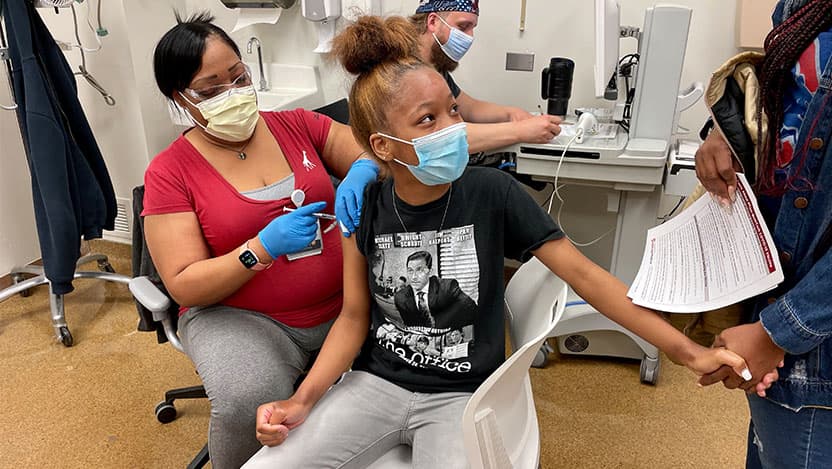COVID-19 vaccine and kids: What parents should know

Maliyah Rather, 14, holds her mother’s hand while she receives the first dose of Pfizer’s COVID-19 vaccine at the University of Chicago Medicine on May 13, 2021. It was the first day adolescents could receive doses of the vaccine, following emergency use authorization by the FDA.
Vaccines for COVID-19 have prevented millions of hospitalizations and deaths since they first became available in the U.S. in 2020. The vaccine offers your best protection against getting COVID-19, as well developing related complications.
Here is what you need to know about the COVID-19 vaccine for children, including how to help your child get ready.
Who should get the COVID-19 vaccine? What does UChicago Medicine recommend?
COVID-19 vaccination is recommended for:
- All children ages 6 to 23 months
- Children ages 2 to 17 who have at least one underlying risk factor, who have weakened immune systems, who have never been previously vaccinated for COVID-19, who live in congregate settings or live in households with those at risk for severe COVID-19
- Children ages 2 to 17 without underlying risk factors whose parents or guardians want them to get a COVID-19 vaccine
- All pregnant people and those who are planning pregnancy, those who are postpartum (after pregnancy), or during lactation
- All adults 18 years and older
The right time to get a COVID-19 vaccine is whenever you can fit it in. Although the vaccine offers the best protection from contracting COVID-19 in the first 8 to 12 weeks after each dose, it offers ongoing protection against hospitalization and complications. Annual booster doses can help reduce those risks even further.
Who can go to a pharmacy to get the COVID-19 vaccine?
Some pharmacies may have COVID-19 vaccines for children; others may not. If you’re planning on getting children 12 or younger vaccinated at a pharmacy, call ahead to make sure they have the dosage for your child.
For adults under the age of 65, some pharmacies may require a prescription or other evidence of a qualifying condition. If you are unable to obtain a vaccine through a pharmacy, call your provider.
Are the side effects of the COVID-19 vaccine the same for kids
Yes, the range of side effects has proven to be similar to what has been seen in adults receiving the vaccine: soreness at the injection site, fatigue, chills, fever and headaches. The side effects last only a day or two.
Can children still get COVID-19 after being vaccinated?
No vaccination is 100% effective, so children could still get COVID-19 after being vaccinated. Like vaccinated adults, if children do become infected with COVID-19, they are much less likely to get severely ill.
Can children also get other vaccines at the same time as the COVID-19 vaccine?
Both children and adults can absolutely get the COVID-19 vaccine at the same time as their annual flu shot or other regular immunizations. In fact, it’s something I strongly encourage with my patients, friends, and even my own children. The influenza vaccine is an important immunization that helps protect us from the seasonal flu and also helps minimize how sick we get if we are infected.
How can I help my child ease their anxiety about the COVID-19 vaccine?
The Child Life team at Comer Children’s Hospital has a lot of great experience helping kids prepare for medical treatments, including immunizations. Here’s some of their best tips:
- Calmly explain what’s going to happen to your child and why it’s important. Planning in advance helps kids mentally prepare and know they won’t be alone.
- Bring something fun and comforting like a tablet or a toy that can help distract a child and lower their anxiety. It’s also helpful to let children choose which item they want to bring with them, since it gives them a feeling of agency.
- Don't project your own fears or be dismissive of their concerns. Kids are great at picking up emotions from parents. If parents stay calm, it will help kids stay calm, too.
- Praise children afterward for doing a great job.

Allison H. Bartlett, MD, MS
Allison Bartlett, MD, MS, specializes in the medical management of acute and chronic infectious diseases.
Learn more about Dr. Bartlett